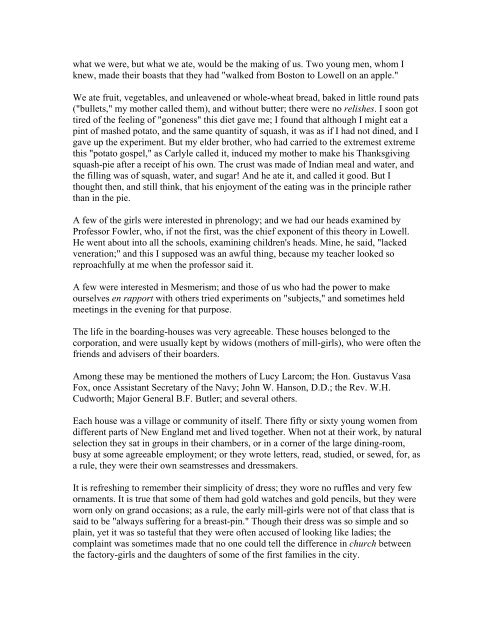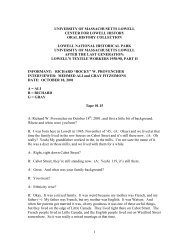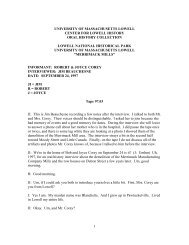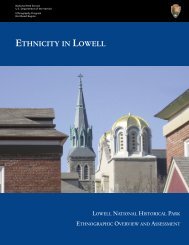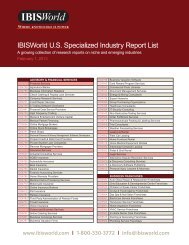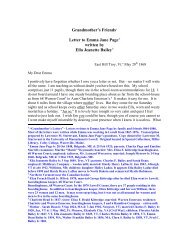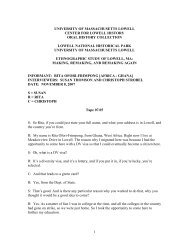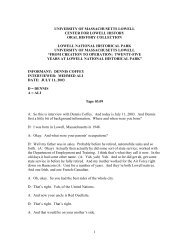LOOM AND SPINDLE OR Life Among the Early Mill Girls WITH A ...
LOOM AND SPINDLE OR Life Among the Early Mill Girls WITH A ...
LOOM AND SPINDLE OR Life Among the Early Mill Girls WITH A ...
Create successful ePaper yourself
Turn your PDF publications into a flip-book with our unique Google optimized e-Paper software.
what we were, but what we ate, would be <strong>the</strong> making of us. Two young men, whom I<br />
knew, made <strong>the</strong>ir boasts that <strong>the</strong>y had "walked from Boston to Lowell on an apple."<br />
We ate fruit, vegetables, and unleavened or whole-wheat bread, baked in little round pats<br />
("bullets," my mo<strong>the</strong>r called <strong>the</strong>m), and without butter; <strong>the</strong>re were no relishes. I soon got<br />
tired of <strong>the</strong> feeling of "goneness" this diet gave me; I found that although I might eat a<br />
pint of mashed potato, and <strong>the</strong> same quantity of squash, it was as if I had not dined, and I<br />
gave up <strong>the</strong> experiment. But my elder bro<strong>the</strong>r, who had carried to <strong>the</strong> extremest extreme<br />
this "potato gospel," as Carlyle called it, induced my mo<strong>the</strong>r to make his Thanksgiving<br />
squash-pie after a receipt of his own. The crust was made of Indian meal and water, and<br />
<strong>the</strong> filling was of squash, water, and sugar! And he ate it, and called it good. But I<br />
thought <strong>the</strong>n, and still think, that his enjoyment of <strong>the</strong> eating was in <strong>the</strong> principle ra<strong>the</strong>r<br />
than in <strong>the</strong> pie.<br />
A few of <strong>the</strong> girls were interested in phrenology; and we had our heads examined by<br />
Professor Fowler, who, if not <strong>the</strong> first, was <strong>the</strong> chief exponent of this <strong>the</strong>ory in Lowell.<br />
He went about into all <strong>the</strong> schools, examining children's heads. Mine, he said, "lacked<br />
veneration;" and this I supposed was an awful thing, because my teacher looked so<br />
reproachfully at me when <strong>the</strong> professor said it.<br />
A few were interested in Mesmerism; and those of us who had <strong>the</strong> power to make<br />
ourselves en rapport with o<strong>the</strong>rs tried experiments on "subjects," and sometimes held<br />
meetings in <strong>the</strong> evening for that purpose.<br />
The life in <strong>the</strong> boarding-houses was very agreeable. These houses belonged to <strong>the</strong><br />
corporation, and were usually kept by widows (mo<strong>the</strong>rs of mill-girls), who were often <strong>the</strong><br />
friends and advisers of <strong>the</strong>ir boarders.<br />
<strong>Among</strong> <strong>the</strong>se may be mentioned <strong>the</strong> mo<strong>the</strong>rs of Lucy Larcom; <strong>the</strong> Hon. Gustavus Vasa<br />
Fox, once Assistant Secretary of <strong>the</strong> Navy; John W. Hanson, D.D.; <strong>the</strong> Rev. W.H.<br />
Cudworth; Major General B.F. Butler; and several o<strong>the</strong>rs.<br />
Each house was a village or community of itself. There fifty or sixty young women from<br />
different parts of New England met and lived toge<strong>the</strong>r. When not at <strong>the</strong>ir work, by natural<br />
selection <strong>the</strong>y sat in groups in <strong>the</strong>ir chambers, or in a corner of <strong>the</strong> large dining-room,<br />
busy at some agreeable employment; or <strong>the</strong>y wrote letters, read, studied, or sewed, for, as<br />
a rule, <strong>the</strong>y were <strong>the</strong>ir own seamstresses and dressmakers.<br />
It is refreshing to remember <strong>the</strong>ir simplicity of dress; <strong>the</strong>y wore no ruffles and very few<br />
ornaments. It is true that some of <strong>the</strong>m had gold watches and gold pencils, but <strong>the</strong>y were<br />
worn only on grand occasions; as a rule, <strong>the</strong> early mill-girls were not of that class that is<br />
said to be "always suffering for a breast-pin." Though <strong>the</strong>ir dress was so simple and so<br />
plain, yet it was so tasteful that <strong>the</strong>y were often accused of looking like ladies; <strong>the</strong><br />
complaint was sometimes made that no one could tell <strong>the</strong> difference in church between<br />
<strong>the</strong> factory-girls and <strong>the</strong> daughters of some of <strong>the</strong> first families in <strong>the</strong> city.


